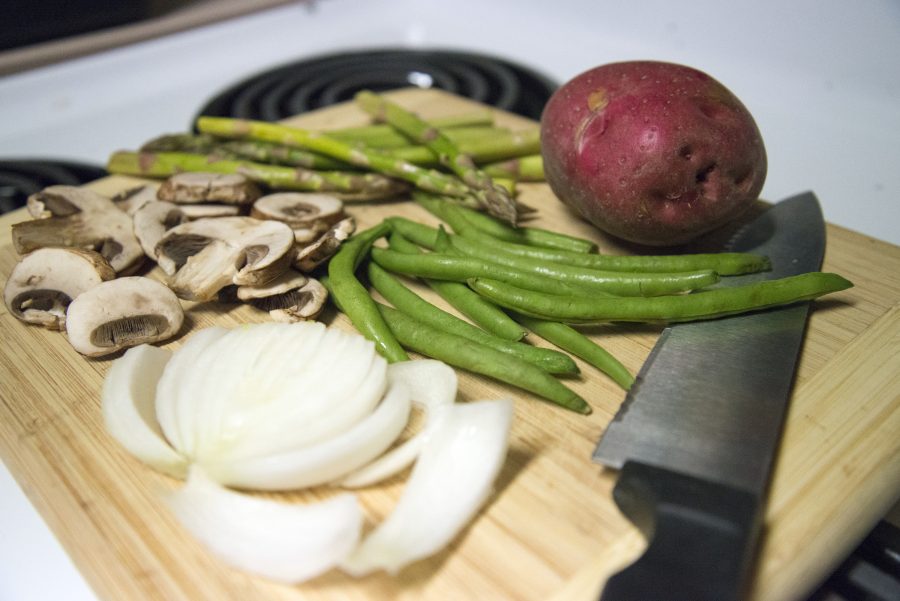“Part of me finding who I am has been identifying myself as a vegetarian,” Spradlin said. “Becoming a vegetarian has been a great start because it lines up with my foundational beliefs: just living a lifestyle that is as healthy as it possibly can be, helping out the environment and supporting local farmers instead of big corporations. It makes sense economically, environmentally and health-wise too.”
While only about four percent of Americans consider themselves vegetarians, around 20 percent of college students are, according to a study done by Vegetarian Times.
“Most days I cook at home for breakfast, lunch and dinner and find it hard to eat on campus much,” Spradlin said.
Spradlin spent his summer working at a camp where every meal had a vegetarian option, and he wishes the culture in Alabama and the South would be more health-conscious than it is now. But he said he sees steps toward that direction.
“This semester has been the best so far, just thinking back to the options I’ve had in the past, and the new salad bar in the Ferg is awesome,” he said. “It has a ton of stuff, and I can get some good protein sources there, like chickpeas. Other than that, the only other really good option I have right now is Subway.”
Some campuses around the country, such as the University of North Texas, are opening vegetarian and vegan dining halls and providing healthier options. With a rapidly growing student body, vegetarian students are often disappointed in the lack of options available at the University.
“In college it’s been a lot harder,” said Caroline Walden, a freshman majoring in nursing and business. “At home I had a kitchen, and my mom knows how to cook special foods, so being here and eating at my sorority house, I feel like I just have to eat a lot of snacks most of the time. But it has made me start to eat more salads, so that’s good at least.”
Walden said having Julia’s Market and Zoe’s Kitchen nearby have been lifesavers but overall, living in Tutwiler has made it difficult for her to make and store food that coincide with her diet.
“Even though it’s been a tough transition, I could never picture myself eating meat again.” she said. “The other day someone was trying to get me to eat a chicken sandwich, and I just physically couldn’t get myself to do it. It would make me sick after this long. My biggest nightmare is me accidentally eating meat and finding out that I did by being sick all the next day.”
The biggest problem Walden and Spradlin face is how being vegetarians can affect them socially.
“When I told my friends I was a vegetarian, they rolled their eyes and couldn’t believe that I would choose to stop eating meat,” said Spradlin. “But they are getting to be pretty open-minded. They invited me to Dreamland one night and I was thankful for the invite, but there isn’t anything there I can eat. It’s just uncomfortable being at a restaurant and not eating anything. I don’t want to look like I’m on a diet. My friends are at least usually pretty accommodating, just not some of the restaurants.”
Walden said she likes how being a vegetarian can be a great conversation starter, but it can make her appear to be someone she’s not.
“It makes me so uncomfortable if I’m eating somewhere that doesn’t have a vegetarian choice, and I have to ask for something else,” she said. “It just makes me feel like a diva and I don’t like that at all. I’m just being healthy.”
Ellie Graff, a sophomore majoring in finance, is a vegan, someone who doesn’t eat any eggs or diary, and faces the same issues when eating with col lege friends or in a restaurant.
“Every single time I go to Mellow Mushroom, without fail, they put cheese on my pizza,” Graff said. “They actually have vegan options here so it’s just funny that people can get confused by my order here, at a more health-conscious place. Sometimes they even put vegan cheese on after I’ve told them I don’t want any and if you’ve had vegan cheese, you would not want that near your dinner either.”
With the changes made at the University over the past few years, Spradlin said he hopes that there will be strides made here nutritionally as well.
“I’d rather have local farmers and businesses cooking my food and producing it instead of the mega corporations like McDonald’s,” he said. “I think most people just need to realize the importance of that and having more vegetarians in this world would be a huge propellant for that change.”









